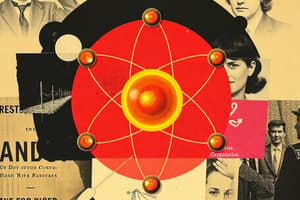Podcast
Questions and Answers
What are atoms primarily composed of?
What are atoms primarily composed of?
- Molecules, Ions, and Electrons
- Particles, Atoms, and Isotopes
- Electrons, Positrons, and Neurons
- Electrons, Neutrons, and Protons (correct)
What do isotopes differ in?
What do isotopes differ in?
- The total mass of the atom
- The number of electrons
- The number of protons
- The number of neutrons (correct)
What type of radiation can isotopes release?
What type of radiation can isotopes release?
- Alpha, Beta, or Gamma Radiation (correct)
- Beta, Gamma, or Zeta Radiation
- Alpha, Beta, or Sigma Radiation
- Alpha, Delta, or Theta Radiation
What is the significance of the half-life of isotopes?
What is the significance of the half-life of isotopes?
What can be inferred if a piece of aluminium is cut repeatedly until only one atom remains?
What can be inferred if a piece of aluminium is cut repeatedly until only one atom remains?
What occurs when an atom gains or loses electrons?
What occurs when an atom gains or loses electrons?
Which statement about isotopes is true?
Which statement about isotopes is true?
What would you expect to observe when looking at an atom under a microscope?
What would you expect to observe when looking at an atom under a microscope?
What is the primary use of measuring the half-life of isotopes?
What is the primary use of measuring the half-life of isotopes?
Which of the following best describes the arrangement of electrons in an atom?
Which of the following best describes the arrangement of electrons in an atom?
Flashcards
Atom
Atom
The smallest unit of an element that retains its chemical properties.
Subatomic Particles
Subatomic Particles
Particles smaller than an atom, including protons, neutrons, and electrons.
Protons
Protons
Positively charged subatomic particles found in the nucleus of an atom.
Neutrons
Neutrons
Signup and view all the flashcards
Electrons
Electrons
Signup and view all the flashcards
Atomic Mass (or Atomic Weight)
Atomic Mass (or Atomic Weight)
Signup and view all the flashcards
Electron Shells
Electron Shells
Signup and view all the flashcards
Ion
Ion
Signup and view all the flashcards
Isotopes
Isotopes
Signup and view all the flashcards
Alpha Radiation
Alpha Radiation
Signup and view all the flashcards
Beta Radiation
Beta Radiation
Signup and view all the flashcards
Gamma Radiation
Gamma Radiation
Signup and view all the flashcards
Half-life
Half-life
Signup and view all the flashcards
Atom divisibility
Atom divisibility
Signup and view all the flashcards
Atom's substructure
Atom's substructure
Signup and view all the flashcards
Atomic size
Atomic size
Signup and view all the flashcards
Study Notes
Atomic Structure and History
- Atoms are composed of subatomic particles
- Atoms have mass
- Electrons are arranged in shells
Ions and Isotopes
- Ions have more or less electrons than the neutral atom
- Isotopes have the same number of protons but different numbers of neutrons
Radioactive Decay
- Isotopes release alpha, beta, or gamma radiation
- Radioactive isotopes decay over time, a process that can be measured by half-life
Applications of Radiation
- Radiation is used in medicine, for example, to treat cancer
- Half-life can be used to determine the age of materials
Studying That Suits You
Use AI to generate personalized quizzes and flashcards to suit your learning preferences.




